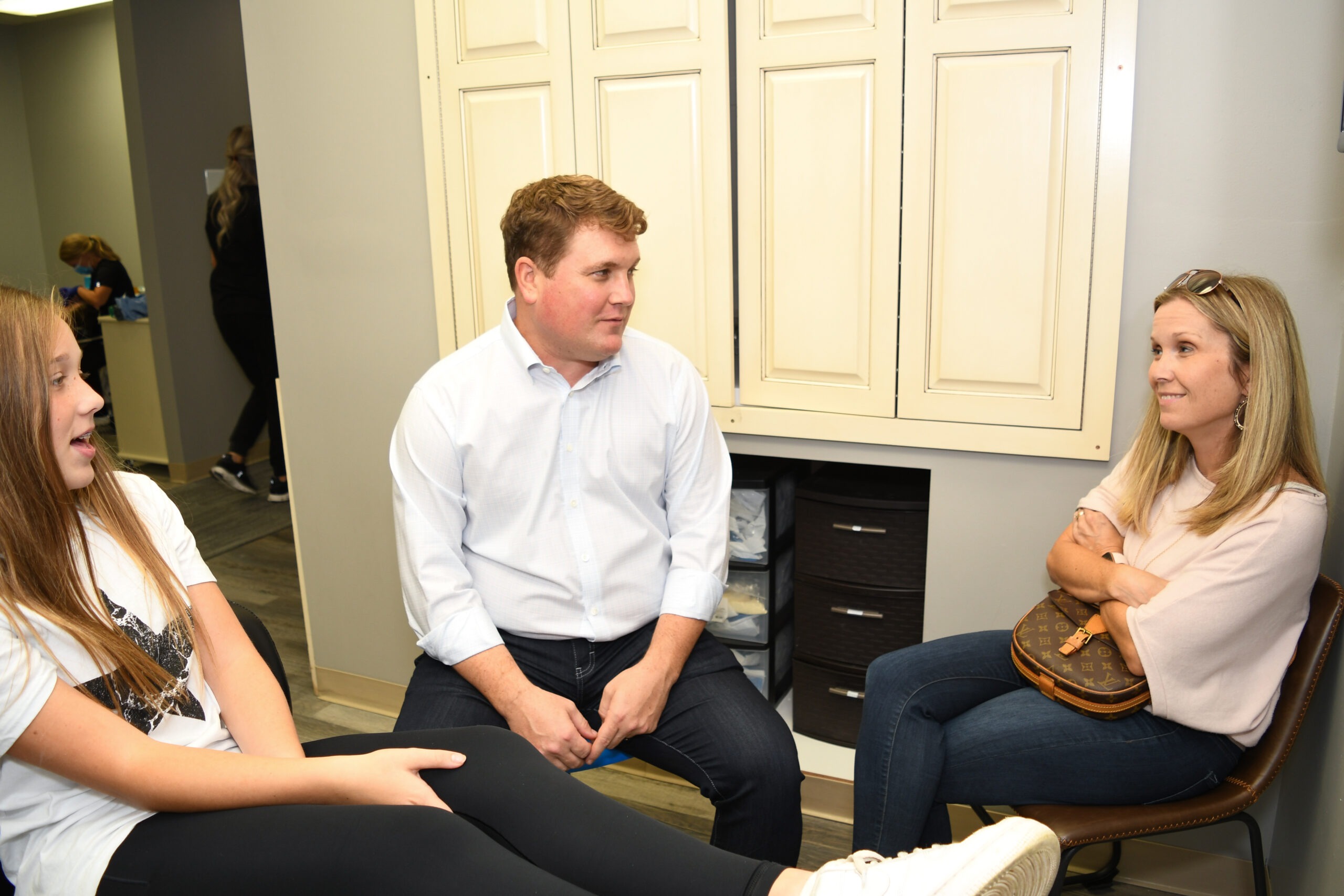Ever tossed and turned at night, only to wake up with a sore jaw? You might be grinding your teeth in your sleep. At Wiesemann Orthodontics, Dr. Wiesemannand our team have seen this nighttime habit affect folks in Bowling Green, Russellville, Portland, and White House. It’s a sneaky issue that can majorly impact your dental health. But don’t worry, we’re here to help you catch it early and give your teeth the restful night they deserve.
Understanding Bruxism
Have you heard the term “bruxism?” Maybe you’ve overheard it in our office. Bruxism is the involuntary grinding or clenching of your teeth. This can happen during the day or at night. But nighttime grinding often goes unnoticed.
Why do people grind their teeth? The reasons can vary—stress, misaligned teeth, or even certain sleep disorders. Dr. Wiesemann often sees patients who didn’t even know they were grinding their teeth until it started causing problems.
The Tell-Tale Signs: How to Know You’re a Grinder
So, how do you know if you’re grinding your teeth at night? Sometimes, the first clue comes from someone else, like a partner who hears the grinding sound while you’re busy sawing logs. But even if you sleep solo, there are other signs to indicate you’re doing it.
Waking up with a sore jaw? Bigred flag. It might be due to grinding if you find yourself rubbing your jaw or temples in the morning. This discomfort can lead to headaches that stick around way too long.
Another sign is sensitive teeth. Does sipping hot or cold drinks make you wince? It could be because grinding has worn down your tooth enamel. When that protective layer gets thin, your teeth become more sensitive to temperature changes.
But it’s not just about physical symptoms. Grinding can also mess with your sleep quality. Grinding disrupts sleep if you feel more tired than usual during the day.
During your check-up, we’ll look for wear patterns on your teeth and ask about any symptoms you’ve been experiencing. Stopping this habit early can save you from a lot of dental drama down the road.
More Than Just a Noisy Night: Risks of Ignoring Bruxism
Ignoring bruxism can lead to some not-so-fun consequences for your teeth and overall health. Over time, the constant grinding wears down your tooth enamel. What’s that? It’s the hard stuff that protects your teeth. Once your enamel is gone, you’re opening the door to cavities and other dental woes.
But wait, there’s more. Grinding can also put a lot of stress on your jaw joint, known as the TMJ (temporomandibular joint). What if you couldn’t enjoy your favorite foods because your jaw hurts? That’s a real downer.
And let’s remember your gums. Constant grinding can cause your gums to pull back, exposing the roots of your teeth. This makes you more prone to gum issues and potentially tooth loss.
The Wiesemann Orthodontics team wants you to know that grinding is more than just a noisy nighttime habit. It’s a serious issue that needs attention. The sooner you tackle it, the better off your smile will be.

Don’t Let Bruxism Grind You Down
So, you’ve spotted the signs and are ready to kick this grinding habit to the curb. We’re here to help! At Wiesemann Orthodontics, Dr. Wiesemann and our top-notch team are here to help you say goodbye to grinding.
One of the first things we’ll examine is whether misaligned teeth are the culprit. Misaligned teeth can encourage grinding. Good news: We’ve got solutions like braces and Invisalign to get those teeth in tip-top shape.
But we don’t stop there. Our office is decked out with the latest technology to make your treatment as smooth as possible. We use advanced digital scanners to get a crystal-clear picture of your teeth.
And because grinding isn’t just about your teeth, we also offer tips to help you relax and manage stress. Simple things like deep breathing exercises can make a world of difference.
At Wiesemann Orthodontics, we get that grinding affects more than just your dental health—it can mess with your whole day. We’re committed to helping you tackle it from all angles.
DIY Fixes: What You Can Do at Home
While professional help is critical, you can also do things at home to curb teeth grinding. First up: oral hygiene. Keeping your teeth clean is a no-brainer. But it’s even more essential if you’re grinding. A solid habit of brushing and flossing can help keep your teeth strong and lessen the impact of grinding.
Stress is often a big trigger for grinding, so finding ways to chill out can help. Deep breathing exercises, a warm bath before bed, or even a quick yoga session can lower stress levels and make grinding less likely.
If you’re still grinding away, consider a dental guard. These fit over your teeth and act like a cushion. They reduce the wear and tear from grinding. You can find these at the drugstore. If necessary, the ones from our office can be custom-fit.
Your diet also plays a role. Reducing caffeine and avoiding big meals right before bedtime can make a difference. Foods that are hard to chew can also stress your teeth and jaw. So, swap that late-night beef jerky for something a bit softer.
Wrap-Up: Take Control of Your Dental Health
Teeth grinding in your sleep is a genuine concern that can affect your overall well-being. At Wiesemann Orthodontics, Dr. Wiesemann and our dedicated team are committed to helping folks in Bowling Green, Russellville, Portland, and White House tackle this issue head-on. Don’t let grinding steal your good night’s sleep or your smile. Ready to take the next step? Schedule your free consultationwith us today, and let’s put an end to grinding once and for all!
